考研英语阅读:作者态度题
- 格式:pdf
- 大小:193.99 KB
- 文档页数:3
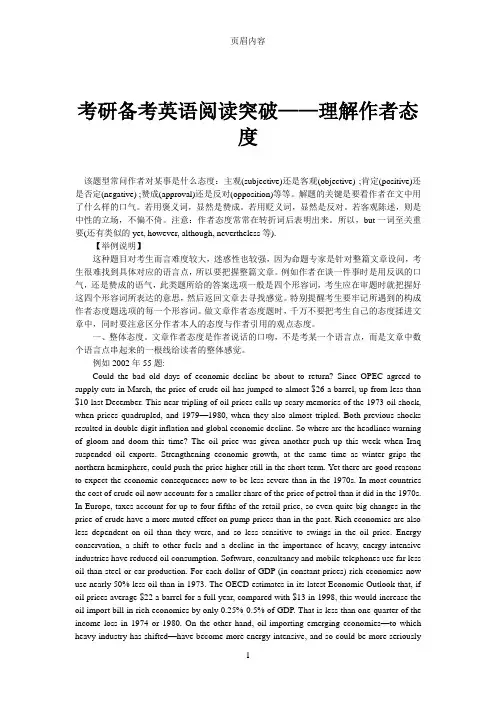
考研备考英语阅读突破——理解作者态度该题型常问作者对某事是什么态度:主观(subjective)还是客观(objective) ;肯定(positive)还是否定(negative) ;赞成(approval)还是反对(opposition)等等。
解题的关键是要看作者在文中用了什么样的口气。
若用褒义词,显然是赞成。
若用贬义词,显然是反对。
若客观陈述,则是中性的立场,不偏不倚。
注意:作者态度常常在转折词后表明出来。
所以,but一词至关重要(还有类似的yet, however, although, nevertheless等).【举例说明】这种题目对考生而言难度较大,迷惑性也较强,因为命题专家是针对整篇文章设问,考生很难找到具体对应的语言点,所以要把握整篇文章。
例如作者在谈一件事时是用反讽的口气,还是赞成的语气,此类题所给的答案选项一般是四个形容词,考生应在审题时就把握好这四个形容词所表达的意思,然后返回文章去寻找感觉。
特别提醒考生要牢记所遇到的构成作者态度题选项的每一个形容词。
做文章作者态度题时,千万不要把考生自己的态度揉进文章中,同时要注意区分作者本人的态度与作者引用的观点态度。
一、整体态度。
文章作者态度是作者说话的口吻,不是考某一个语言点,而是文章中数个语言点串起来的一根线给读者的整体感觉。
例如2002年55题:Could the bad old days of economic decline be about to return? Since OPEC agreed to supply-cuts in March, the price of crude oil has jumped to almost $26 a barrel, up from less than $10 last December. This near-tripling of oil prices calls up scary memories of the 1973 oil shock, when prices quadrupled, and 1979—1980, when they also almost tripled. Both previous shocks resulted in double-digit inflation and global economic decline. So where are the headlines warning of gloom and doom this time? The oil price was given another push up this week when Iraq suspended oil exports. Strengthening economic growth, at the same time as winter grips the northern hemisphere, could push the price higher still in the short term. Yet there are good reasons to expect the economic consequences now to be less severe than in the 1970s. In most countries the cost of crude oil now accounts for a smaller share of the price of petrol than it did in the 1970s. In Europe, taxes account for up to four-fifths of the retail price, so even quite big changes in the price of crude have a more muted effect on pump prices than in the past. Rich economies are also less dependent on oil than they were, and so less sensitive to swings in the oil price. Energy conservation, a shift to other fuels and a decline in the importance of heavy, energy-intensive industries have reduced oil consumption. Software, consultancy and mobile telephones use far less oil than steel or car production. For each dollar of GDP (in constant prices) rich economies now use nearly 50% less oil than in 1973. The OECD estimates in its latest Economic Outlook that, if oil prices average $22 a barrel for a full year, compared with $13 in 1998, this would increase the oil import bill in rich economies by only 0.25%-0.5% of GDP. That is less than one-quarter of the income loss in 1974 or 1980. On the other hand, oil-importing emerging economies—to which heavy industry has shifted—have become more energy-intensive, and so could be more seriously1squeezed. One more reason not to lose sleep over the rise in oil prices is that, unlike the rises in the 1970s, it has not occurred against the backbone of general commodity-price inflation and global excess demand. A sizable portion of the world is only just emerging from economic decline. The Economist’s commodity price index is broadly unchanging from a year ago. In 1973 commodity prices jumped by 70% and in 1979 by almost 30%.From the text we can see that the writer seems.[A] optimistic[B] sensitive[C] gloomy[D] scared本段开头用设问句引出问题,再通过严谨地分析,结合数字的对比,得出乐观的结论。
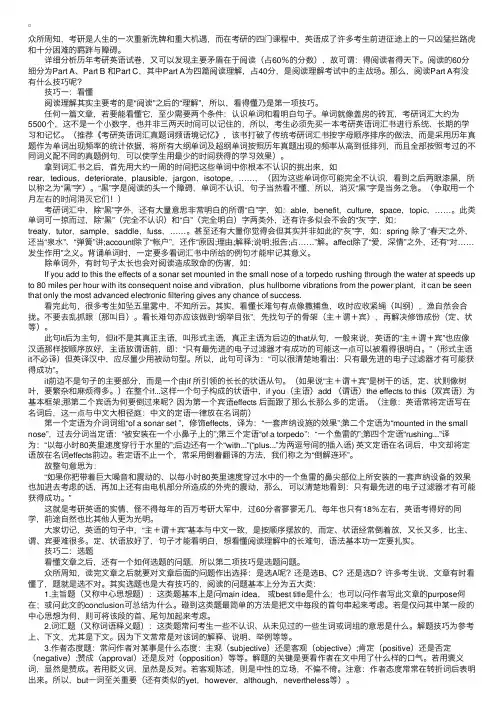
众所周知,考研是⼈⽣的⼀次重新洗牌和重⼤机遇,⽽在考研的四门课程中,英语成了许多考⽣前进征途上的⼀只凶猛拦路虎和⼗分困难的羁跘与障碍。
详细分析历年考研英语试卷,⼜可以发现主要⽭盾在于阅读(占60%的分数),故可谓:得阅读者得天下。
阅读的60分细分为Part A、Part B 和Part C,其中Part A为四篇阅读理解,占40分,是阅读理解考试中的主战场。
那么,阅读Part A有没有什么技巧呢? 技巧⼀:看懂 阅读理解其实主要考的是“阅读”之后的“理解”,所以,看得懂乃是第⼀项技巧。
任何⼀篇⽂章,若要能看懂它,⾄少需要两个条件:认识单词和看明⽩句⼦。
单词就像盖房的砖⽡,考研词汇⼤约为5500个,这不是⼀个⼩数字,也并⾮三两天时间可以记住的,所以,考⽣必须先买⼀本考研英语词汇书进⾏系统、长期的学习和记忆。
(推荐《考研英语词汇真题词频语境记忆》,该书打破了传统考研词汇书按字母顺序排序的做法,⽽是采⽤历年真题作为单词出现频率的统计依据,将所有⼤纲单词及超纲单词按照历年真题出现的频率从⾼到低排列,⽽且全部按照考过的不同词义配不同的真题例句,可以使学⽣⽤最少的时间获得的学习效果)。
拿到词汇书之后,⾸先⽤⼤约⼀周的时间把这些单词中你根本不认识的挑出来,如rear,tedious,deteriorate,plausible,jargon,isotope,……,(因为这些单词你可能完全不认识,看到之后两眼漆⿊,所以称之为“⿊”字)。
“⿊”字是阅读的头⼀个障碍,单词不认识,句⼦当然看不懂,所以,消灭“⿊”字是当务之急。
(争取⽤⼀个⽉左右的时间消灭它们!) 考研词汇中,除“⿊”字外,还有⼤量意思⾮常明⽩的所谓“⽩”字,如:able,benefit,culture,space,topic,……。
此类单词可⼀掠⽽过,除“⿊”(完全不认识)和“⽩”(完全明⽩)字两类外,还有许多似会不会的“灰”字,如:treaty,tutor,sample,saddle,fuss,……。
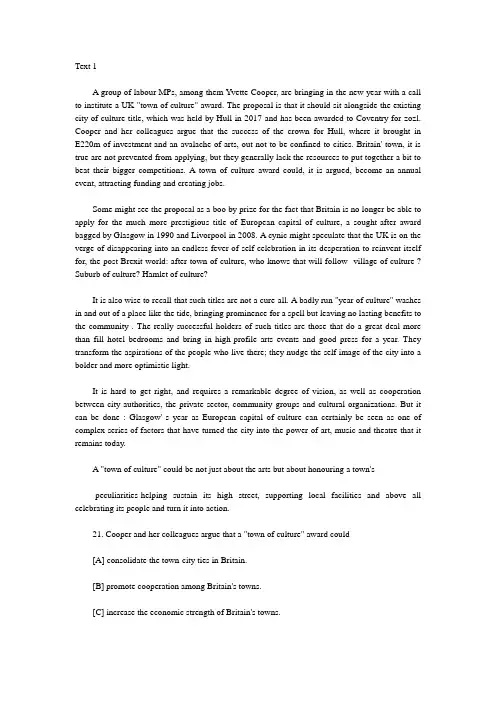
Text 1A group of labour MPs, among them Yvette Cooper, are bringing in the new year with a call to institute a UK "town of culture" award. The proposal is that it should sit alongside the existing city of culture title, which was held by Hull in 2017 and has been awarded to Coventry for zozl. Cooper and her colleagues argue that the success of the crown for Hull, where it brought in E220m of investment and an avalache of arts, out not to be confined to cities. Britain' town, it is true are not prevented from applying, but they generally lack the resources to put together a bit to beat their bigger competitions. A town of culture award could, it is argued, become an annual event, attracting funding and creating jobs.Some might see the proposal as a boo by prize for the fact that Britain is no longer be able to apply for the much more prestigious title of European capital of culture, a sought-after award bagged by Glasgow in 1990 and Livorpool in 2008. A cynic might speculate that the UK is on the verge of disappearing into an endless fever of self-celebration in its desperation to reinvent itself for, the post-Brexit world: after town of culture, who knows that will follow- village of culture ? Suburb of culture? Hamlet of culture?It is also wise to recall that such titles are not a cure-all. A badly run "year of culture" washes in and out of a place like the tide, bringing prominence for a spell but leaving no lasting benefits to the community . The really successful holders of such titles are those that do a great deal more than fill hotel bedrooms and bring in high-profile arts events and good press for a year. They transform the aspirations of the people who live there; they nudge the self image of the city into a bolder and more optimistic light.It is hard to get right, and requires a remarkable degree of vision, as well as cooperation between city authorities, the private sector, community groups and cultural organizations. But it can be done : Glasgow' s year as European capital of culture can certainly be seen as one of complex series of factors that have turned the city into the power of art, music and theatre that it remains today.A "town of culture" could be not just about the arts but about honouring a town'speculiarities-helping sustain its high street, supporting local facilities and above all celebrating its people and turn it into action.21. Cooper and her colleagues argue that a "town of culture" award could________[A] consolidate the town-city ties in Britain.[B] promote cooperation among Britain's towns.[C] increase the economic strength of Britain's towns.[D] focus Britain's limited resources on cultural events.22. According to Paragraph 2, the proposal might be regarded by some as________[A] a sensible compromise.[B] a self-deceiving attempt.[C] an eye-catching bonus.[D] an inaccessible target.23. The author suggests that a title holder is successful only if it________[A] endeavours to maintain its image.[B] meets the aspirations of its people.[C] brings its local arts to prominence.D] commits to its long-term growth.24. Glasgow is mentioned in Paragraph 3 to present________[A] a contrasting case.[B] a supporting example.[C] a background story,[D] a related topic.25. What is the author's attitude towards the proposal ?[A] Skeptical[B] Objective[C] Favourable[D] Critical21 C increase the economic strength of Britain’s towns这道题是细节题。
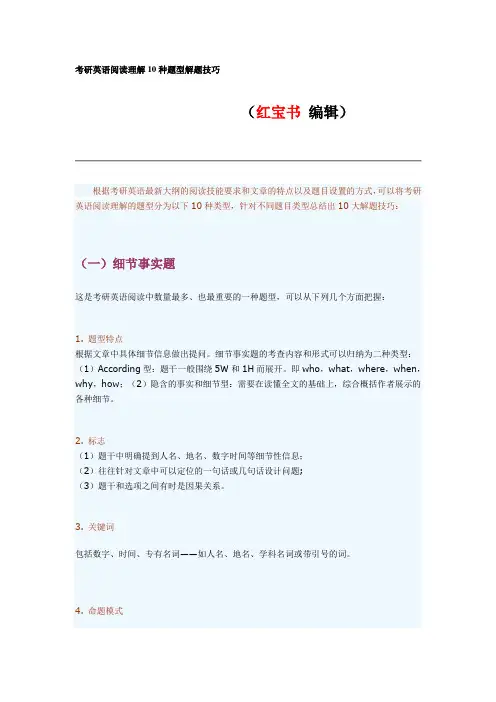
考研英语阅读理解10种题型解题技巧(红宝书编辑)根据考研英语最新大纲的阅读技能要求和文章的特点以及题目设置的方式,可以将考研英语阅读理解的题型分为以下10种类型,针对不同题目类型总结出10大解题技巧:(一)细节事实题这是考研英语阅读中数量最多、也最重要的一种题型,可以从下列几个方面把握:1. 题型特点根据文章中具体细节信息做出提问。
细节事实题的考查内容和形式可以归纳为二种类型:(1)According型:题干一般围绕5W和1H而展开。
即who,what,where,when,why,how;(2)隐含的事实和细节型:需要在读懂全文的基础上,综合概括作者展示的各种细节。
2. 标志(1)题干中明确提到人名、地名、数字时间等细节性信息;(2)往往针对文章中可以定位的一句话或几句话设计问题;(3)题干和选项之间有时是因果关系。
3. 关键词包括数字、时间、专有名词——如人名、地名、学科名词或带引号的词。
4. 命题模式According to the passage / the author,who(what,where,which,when,why,how etc.)5. 做题关键:准确定位、返回原文。
(1)根据题干中的明确关键词返回原文;(2)根据题干中的重点词或其同义词(如名词、动词、形容词等)返回原文;(3)根据原文中的特殊语言现象,要善于利用因果、类比、时间、空间的关系将零碎的细节组成一个逻辑分明的有机体。
如转折词but、however、yet等定位。
6. 做题步骤(1)根据段落中主题句的名词粗略确定段落内容方向;(2)利用题干提问的内容,大致定位对应的段落;(3)利用题干中的重要信息词准确确定相关信息句,进行判断并确定细节题的正确答案。
7. 注意事项干扰选项的特征:(1)正反混淆选项的内容和作者在原文中提到的信息相反。
(2)偷换概念选项提到了原文的内容,但是却将原文对应部分中的另一个关键词或短语换成了意思不同的其他词汇。
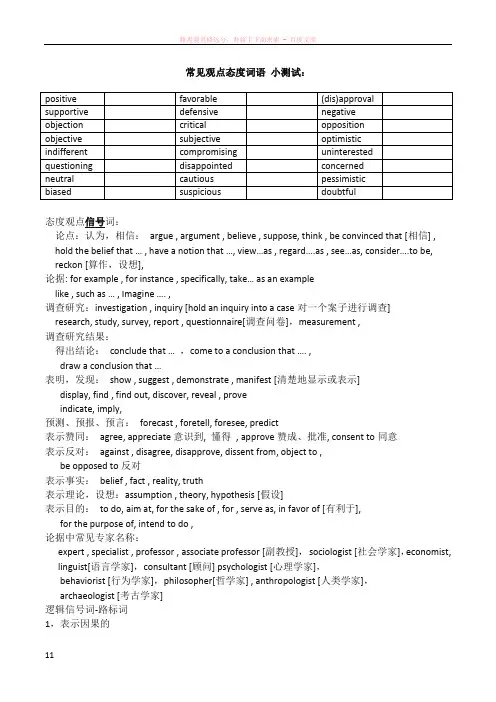
常见观点态度词语小测试:positive favorable(dis)approvalsupportive defensive negativeobjection critical oppositionobjective subjective optimisticindifferent compromising uninterestedquestioning disappointed concernedneutral cautious pessimisticbiased suspicious doubtful态度观点信号词:论点:认为,相信:argue , argument , believe , suppose, think , be convinced that [相信] , hold the belief that … , have a notion that …, view…as , regard….as , see…as, consider….to be, reckon [算作,设想],论据: for example , for instance , specifically, take… as an examplelike , such as … , Imagine …. ,调查研究:investigation , inquiry [hold an inquiry into a case对一个案子进行调查]research, study, survey, report , questionnaire[调查问卷],measurement ,调查研究结果:得出结论:conclude th at … ,come to a conclusion that …. ,draw a conclusion that …表明,发现:show , suggest , demonstrate , manifest [清楚地显示或表示]display, find , find out, discover, reveal , proveindicate, imply,预测、预报、预言:forecast , foretell, foresee, predict表示赞同:agree, appreciate意识到, 懂得, approve赞成、批准, consent to同意表示反对:against , disagree, disapprove, dissent from, object to ,be opposed to反对表示事实:belief , fact , reality, truth表示理论,设想:assumption , theory, hypothesis [假设]表示目的:to do, aim at, for the sake of , for , serve as, in favor of [有利于],for the purpose of, intend to do ,论据中常见专家名称:expert , specialist , professor , associate professor [副教授],sociologist [社会学家],economist, linguist[语言学家],consultant [顾问] psychologist [心理学家],behaviorist [行为学家],philosopher[哲学家] , anthropologist [人类学家],archaeologist [考古学家]逻辑信号词-路标词1,表示因果的原因:后接句子--- Because, since , as , for后接词组--- because of , thanks to由于,多亏, owing to 由于, 因...之缘故, due to , as a result of 作为结果,by/in virtue of [由于]* The movie touched me by virtue of its story.结果:so(that), accordingly[因此];as a result; consequently; for this(that)reason; hence; therefore此外:表因果的特色词汇比如A 是因,B是果:Greenhouse effect is responsible for weather changeA account for / be responsible for BA cause / lead to / result in / bring about / bring on / trigger /give rise to B2,表示转折的“但是,然而”:but , however; yet , nevertheless, whereas“尽管,虽然”:后接句子--- although , though, even though , while ,#notwithstanding后接词组--- despite; in spite of“相反地”:conversely[相反地] ; on the contrary;“另一方面”:on the other hand;3,表示比较的by comparison ; in contrast (相比之下); in the same way; similarly4,表示递进的also; besides; furthermore; in addition; in particular(特别地)more importantly; moreover; What’s more5,表示概括的in brief; in conclusion; in short; in a word , in sum; to sum up; on the whole , to conclude6.表示并列:and , or , at the same time, meanwhile , as well as一、态度词汇总1.积极:approving 赞许的,,optimistic 乐观的, sympathetic 同情的, consent 赞成2.消极:negative否定的,消极的,反面的,pessimistic 悲观的,apprehensive 忧虑的,reserved 有保留的,内向的,arbitrary武断的, biased有偏见的,偏心的, partial 不公平的, critical 持批评态度的, depressing 令人沮丧的,disappointing令人失望的, doubtful怀疑的,object反对, be opposed to/opposing反对的, scared惊恐的,panick恐慌, sensitive敏感的,subjective主观的, suspicious怀疑的3.中性:objective 客观的,impartial 公平的, unbiased公正的4. 情绪:anger愤怒, indignant 愤怒的r, happy高兴的, contempt轻视, gloomy沮丧的5.其它:surprized惊奇的, amazed惊奇的, puzzled迷惑的, ambiguous模棱两可的, neutral 中立的,indifferent漠不关心的, subjective 主观的6.对态度的修饰词:reserved有保留的, cautiously谨慎地, enthusiatic热烈的, strong强烈的, radical激进的二、态度词分析1.可能的态度:考研阅读考的的态度有两种,一种是作者,另一是非作者的其它人。
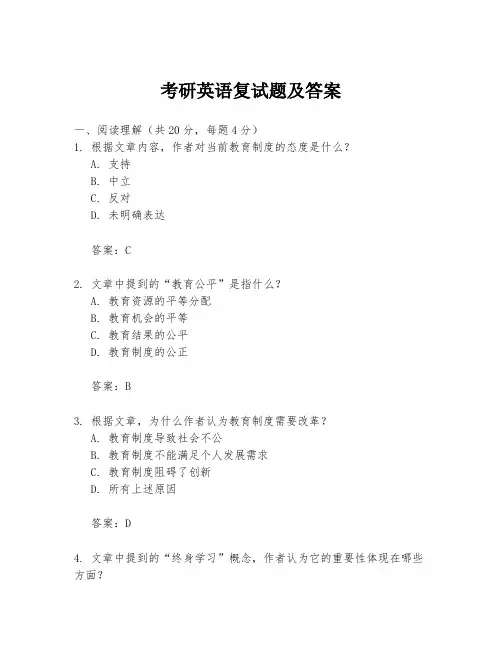
考研英语复试题及答案一、阅读理解(共20分,每题4分)1. 根据文章内容,作者对当前教育制度的态度是什么?A. 支持B. 中立C. 反对D. 未明确表达答案:C2. 文章中提到的“教育公平”是指什么?A. 教育资源的平等分配B. 教育机会的平等C. 教育结果的公平D. 教育制度的公正答案:B3. 根据文章,为什么作者认为教育制度需要改革?A. 教育制度导致社会不公B. 教育制度不能满足个人发展需求C. 教育制度阻碍了创新D. 所有上述原因答案:D4. 文章中提到的“终身学习”概念,作者认为它的重要性体现在哪些方面?A. 适应社会变化B. 促进个人发展C. 提高就业竞争力D. 所有上述方面答案:D5. 文章最后一段提到了哪些教育改革的建议?A. 增加教育投入B. 改革考试制度C. 鼓励创新思维D. 所有上述建议答案:D二、完形填空(共15分,每题1.5分)阅读下面短文,从短文后各题所给的四个选项(A、B、C和D)中,选出可以填入空白处的最佳选项。
In recent years, the popularity of online education has been growing rapidly. It offers a convenient way for people tolearn new skills without leaving their homes. However, there are still some concerns about the quality of online education.6. The reason why online education is becoming more popularis that it is _______.A. affordableB. accessibleC. enjoyableD. challenging答案:B7. One of the main concerns about online education is the_______ of the courses.A. costB. contentC. qualityD. duration答案:C8. Many people believe that online learning can be as _______ as traditional classroom learning.A. effectiveB. expensiveC. time-consumingD. difficult答案:A9. The author suggests that online education can be improved by _______.A. increasing the number of coursesB. improving the interaction between students and teachersC. reducing the costD. extending the duration of courses答案:B10. According to the passage, what is the future of online education likely to be?A. uncertainB. promisingC. limitedD. expensive答案:B三、翻译(共25分,英译汉15分,汉译英10分)1. 英译汉(15分)Translate the following passage into Chinese."The advancement of technology has brought about significant changes in the way we live and work. The internet, in particular, has revolutionized the way we access information and communicate with each other."翻译:技术的进步极大地改变了我们生活和工作的方式。

考研英语:阅读中观点细节题和态度题的区别在细节题中有一种非常典型突出的类型,值得考生特别留意,即针对作者或文中人物观点本身进行提问的细节题,我们给它起名字叫做观点细节题,即在观点处出题的细节题。
这种题型概念上容易和态度题混淆,但实则两种类型题差别很大,一个是对于态度的考察,一个是对于细节的考察;另外观察选项,态度题选项多为表示态度的形容词或动词,细节题因为是对观点本身的考察,所以选项较长。
对于观点处出题的细节题,通过对历年真题的梳理和总结,另外结合实用性,总结出了一些自己的分类和方法。
下面的文章中,跨考教育英语教研室王老师将从两个方面进行探讨,首先是针对观点处出题的细节题,自己的一些方法总结;然后是对于观点处出题的细节题(即观点细节题)和态度题的区别的简要说明。
一、观点类细节题分类:通过对观点处出题的细节题的观察分析,我将观点处出题的细节题按照题干分为如下两类:a. according to the author类这种情况又可以进一步分为:1)题干中能找到文中出现频率低的词的,那么考生可以直接根据出现频率低的实词定位,回到原文当中找到题干出处,重叠选项,找出正确答案。
对于这种方法的实用性,我也做了验证,如:2001 text 4 64. ,2006 text 1 22.,2007 text 3 33.,2005 text 2 29.都可以用这种方法做出来。
2)题干中不能找到文中出现频率低的词的,从出题人的角度来讲,命题人的目的不是为了考倒大家,是为了考察大家的语言能力和逻辑思维的能力,所以出题人在命题的时候,一定是会想办法让你做出来的,对于细节题,方法主要是定位,要么你可以从选项出发定位,要么可以通过题干定位,如果题干没有给你任何信息,选项中有没办法定位,或是跟个人英语能力有关,找不到定位词的时候,这个时候就找一个最贴近主旨的选项,置于主旨的判断方法,主旨题模块介绍了很多,总有一款是适合你的。
这种情况的实用性如何呢,那我们就用真题来说明问题吧,看下下面这些年份的真题及其选项解析,你就会了解了:2008 text 333.,2004 text 3 55. ,2004 text 4 60. ,2006 text 4 38.,2003 text 2 29.。
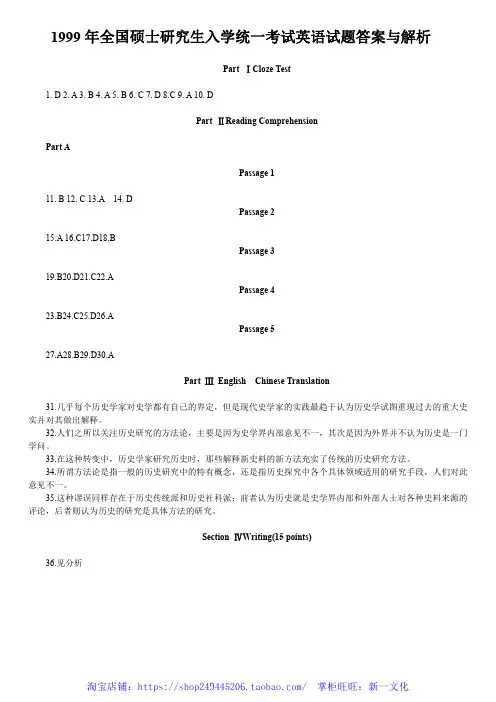
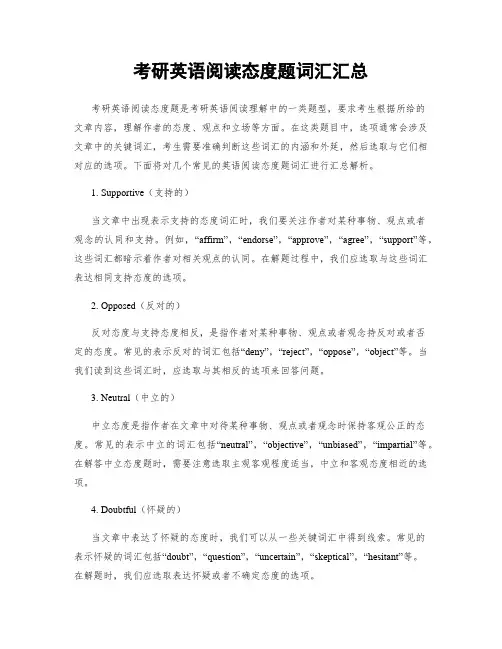
考研英语阅读态度题词汇汇总考研英语阅读态度题是考研英语阅读理解中的一类题型,要求考生根据所给的文章内容,理解作者的态度、观点和立场等方面。
在这类题目中,选项通常会涉及文章中的关键词汇,考生需要准确判断这些词汇的内涵和外延,然后选取与它们相对应的选项。
下面将对几个常见的英语阅读态度题词汇进行汇总解析。
1. Supportive(支持的)当文章中出现表示支持的态度词汇时,我们要关注作者对某种事物、观点或者观念的认同和支持。
例如,“affirm”,“endorse”,“approve”,“agree”,“support”等,这些词汇都暗示着作者对相关观点的认同。
在解题过程中,我们应选取与这些词汇表达相同支持态度的选项。
2. Opposed(反对的)反对态度与支持态度相反,是指作者对某种事物、观点或者观念持反对或者否定的态度。
常见的表示反对的词汇包括“deny”,“reject”,“oppose”,“object”等。
当我们读到这些词汇时,应选取与其相反的选项来回答问题。
3. Neutral(中立的)中立态度是指作者在文章中对待某种事物、观点或者观念时保持客观公正的态度。
常见的表示中立的词汇包括“neutral”,“objective”,“unbiased”,“impartial”等。
在解答中立态度题时,需要注意选取主观客观程度适当,中立和客观态度相近的选项。
4. Doubtful(怀疑的)当文章中表达了怀疑的态度时,我们可以从一些关键词汇中得到线索。
常见的表示怀疑的词汇包括“doubt”,“question”,“uncertain”,“skeptical”,“hesitant”等。
在解题时,我们应选取表达怀疑或者不确定态度的选项。
5. Optimistic(乐观的)/Pessimistic(悲观的)当文章中表达了对于某种事物、观点或者观念的乐观或者悲观态度时,我们需要从相关词汇中寻找线索。
常见的表示乐观态度的词汇有“optimistic”,“hopeful”,“positive”等;表示悲观态度的词汇有“pessimistic”,“negative”,“doubtful”等。
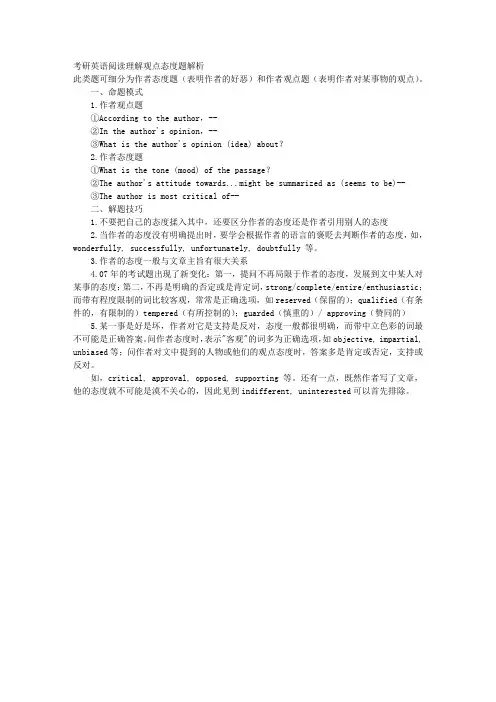
考研英语阅读理解观点态度题解析此类题可细分为作者态度题(表明作者的好恶)和作者观点题(表明作者对某事物的观点)。
一、命题模式1.作者观点题①According to the author,--②In the author's opinion,--③What is the author's opinion (idea) about?2.作者态度题①What is the tone (mood) of the passage?②The author's attitude towards...might be summarized as (seems to be)--③The author is most critical of--二、解题技巧1.不要把自己的态度揉入其中,还要区分作者的态度还是作者引用别人的态度2.当作者的态度没有明确提出时,要学会根据作者的语言的褒贬去判断作者的态度,如,wonderfully, successfully, unfortunately, doubtfully 等。
3.作者的态度一般与文章主旨有很大关系4.07年的考试题出现了新变化:第一,提问不再局限于作者的态度,发展到文中某人对某事的态度;第二,不再是明确的否定或是肯定词,strong/complete/entire/enthusiastic;而带有程度限制的词比较客观,常常是正确选项,如reserved(保留的);qualified(有条件的,有限制的)tempered(有所控制的);guarded(慎重的)/ approving(赞同的)5.某一事是好是坏,作者对它是支持是反对,态度一般都很明确,而带中立色彩的词最不可能是正确答案。
问作者态度时,表示"客观"的词多为正确选项,如objective, impartial, unbiased等;问作者对文中提到的人物或他们的观点态度时,答案多是肯定或否定,支持或反对。
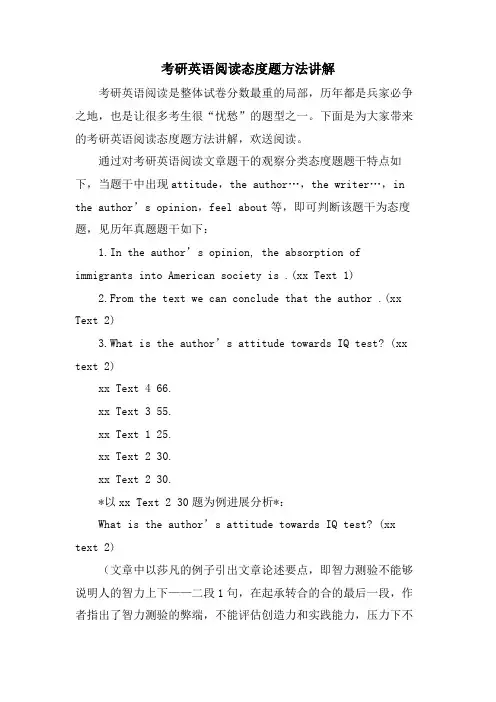
考研英语阅读态度题方法讲解考研英语阅读是整体试卷分数最重的局部,历年都是兵家必争之地,也是让很多考生很“忧愁”的题型之一。
下面是为大家带来的考研英语阅读态度题方法讲解,欢送阅读。
通过对考研英语阅读文章题干的观察分类态度题题干特点如下,当题干中出现attitude,the author...,the writer (i)the author’s opinion,feel about等,即可判断该题干为态度题,见历年真题题干如下:1.In the author’s opinion, the absorption of immigrants into American society is .(xx Text 1)2.From the text we can conclude that the author .(xx Text 2)3.What is the author’s attitude towards IQ test? (xx text 2)xx Text 4 66.xx Text 3 55.xx Text 1 25.xx Text 2 30.xx Text 2 30.*以xx Text 2 30题为例进展分析*:What is the author’s attitude towards IQ test? (xx text 2)(文章中以莎凡的例子引出文章论述要点,即智力测验不能够说明人的智力上下——二段1句,在起承转合的合的最后一段,作者指出了智力测验的弊端,不能评估创造力和实践能力,压力下不能评估领导能力,通过串线法把握文章脉络,可见作者是持疑心态度的。
)[A] Supportive. 反向干扰[B] Skeptical.[C] Impartial. 作者侧重讨论缺乏之处,不是中立的态度,中立态度一般放在文中既讨论有利之处又讨论弊端的文章中[D] Biased. 文中质疑智力测验有理有据,所以并不能够说是偏见。
2017考研英语阅读理解之如何解答态度题来源:智阅网态度题是指根据阅读理解的文章内容,整理、理解或判断作者的情感态度等的题型。
此题有一定难度,很多同学在读完文章之后,不能正确判断作者在阅读理解中的态度。
那么,就让我们一起了解一下,该如何解答态度题。
1、标志:题干中出现attitude ,believe ,consider, deam,regard,deem。
2、作者态度可以分为三大类:(1)正态度:支持,乐观,赞同;(2)客观、中立、公正;(3)反对、批评、怀疑。
3、等价选项都不选。
4、有些选项一定不是正确答案(永陪选项):indifferent(漠不关心);subjective(主观的);biased(有偏见的);puzzled(迷惑不解的)。
5、识别作者态度:方法一:可以根据作者论述的主线及举例的方式进行判断;方法二:当作者态度没有明确提出时,找文章中有褒贬含义、含有感情色彩的词。
6、特别注意作者的态度一般与文章中心相联系。
做题时不要把自己的态度纳入其中,而且要注意区分作者的态度和作者引用别人的态度。
态度题新趋势:1、现在题目的考察不仅仅局限于作者的态度,也开始考察文章中某人的观点和态度,做题时特别应该注意看清楚题目考察的是谁对谁的态度。
2、选项可能不在是态度明确的肯定或者否定的词,而是改为带有程度限制的词语,带有如下词语的选项往往是正确的:guarded(慎重的),qualified(有条件的),tempered(缓和的),因为带有保留态度的观点比较客观,一般带有绝对化或者过于强烈的词的选项必然是错误的,如:strongly,compeletly,entirely。
了解了以上内容之后,我们再做做谭剑波老师的2017《考研英语(二)阅读强化特训60篇》,会更有收获的。
想买这本书的同学,可以去智阅网上看看,最近之业务上,有很多购书优惠,买得越多,折扣越多。
一.情感态度题旳词语选项一般可以分为如下几种:1.褒义词impartial,(公正旳), rewarding(有回报旳), appreciative (欣赏旳),positive (肯定旳, 积极旳), optimistic (乐观旳), useful (有用旳, 有益旳), admiring (赞赏旳, 钦佩旳), interesting (有趣旳), instructive (有益旳, 教育性旳), enthusiastic (热心旳, 热情旳), supportive (支持旳), support(支持), approval (赞成, 承认), approving (满意旳), confident (自信旳, 确信旳), impressed (留下印象旳), reverent (尊敬旳), polite (有礼貌旳, 文雅旳)。
2.贬义词Apprehensive(担忧旳), hostile (敌对旳), dubious(怀疑旳),intolerant (不能容忍旳), negative (否认旳, 消极旳), pessimistic (消极旳, 厌世旳), subjective (主观旳, 个人旳), disappointed (失望旳), frustrated (失败旳, 落空旳), critical (批评旳), questioning (质疑旳), doubtful (可疑旳, 不确旳), compromising (妥协旳), dissatisfied (不满意旳, 不快乐旳), biased (有偏见旳), satirical (挖苦旳), puzzling (困惑旳), suspicious (怀疑旳), gloomy (令人沮丧旳), scared (恐惊旳), cynical (愤世嫉俗旳), oppose (反对), opposition (反对), disgust (令人反感), disgusting (令人厌恶旳), worried (闷闷不乐旳), depressed (沮丧旳), contemptuous (轻蔑旳, 欺侮旳), arbitrary/opinionated (武断旳) 。
作者态度题每年都会涉及,题量不会很大,基本每次一题。
但能否把握作者态度对于文章的整体理解是至关重要的。
1.标志:attitude2.作者的态度只分为三种:支持或赞同;中立或客观;怀疑、批评或反对3. 判定作者态度的方法A)寻找带有作者强烈感情色彩的名词、动词、形容词或者副词来判定作者态度。
如2009年大纲样题(1996年真题)“The growth of the limited liability company and municipal business had important consequences. Such large, impersonal manipulation of capital and industry greatly increased the numbers and importance of shareholders as a class, an element in national life representing irresponsible (不负责任的,明显是一个贬义词,作者就是批判股东的)wealth detached from the land and the duties of the landowners; and almost equally detached from the responsible management of business.”“Fortunately, (幸运的,明显后面连接的是作者支持的,即行业公会起了一个好的作用)however, the increasing power and organisation of the trade unions, at least in all skilled trades, enabled the workmen to meet on equal terms the managers of the companies who employed them.”61. According of the passage, all of the following are true except that ________.[A] the shareholders were unaware of the needs of the workers[B] the old firm owners had a better understanding of their workers[C] the limited liability companies were too large to run smoothly[D] the trade unions seemed to play a positive role (行业公会扮演了一个积极的角色)62. The author is most critical of ________.[A] family firm owners[B] landowners[C] managers[D] shareholders (批判股东)B)段首句中含有“but, yet, however, in fact”类表示强转折关系的词时,这句话通常表征作者观点。
考研备考英语二阅读态度题解题原则在考研备考英语二考试阅读理解题型中,作者态度题几乎每年都会涉及,但题量不会很大,平均下来每年一道题左右,但如果考生希望拿到理想的阅读分数,这道态度题几乎是必须做对的。
在解题过程中,我们要注意以下几点原则:第一,问作者对某事物的态度时中,表示客观的词多为正确选项,如objective, impartial。
第二,既然写了文章,那么作者的态度就不会是漠不关心,因此当问及作者对文中主题词的态度时,见到indifferent, uninterested这类词基本可以排除。
第三,某一事物是好还是坏,作者对它是支持还是反对,只要作者写的是真正的议论文,态度一般都会比较明确,而带中立色彩的词相对来讲不容易成为正确答案,如neutral等。
第四,注意不要把我们自己的好恶态度糅进其中,不要用带有主观倾向的视角评判作者态度。
第五,作者引用别人的观点时,我们勿必分辨清楚作者引用的观点是作为支持还是反对的例证,要注意区分作者本人的态度和作者引用的观点的态度。
第六,在做阅读题时,每位考生应该清醒地认识到我们是读者,一旦要读者对作者进行评论时,必须小心谨慎,如履薄冰,尽量不要用贬义词去表述作者态度,否则就是对作者的不敬,后果想必会比较严重。
总之,只要掌握以上原则,我们在处理态度题时会比较得法,而且正确率也会提高。
此外,工欲善其事,必先利其器。
大家做题之前,应先熟悉在考题中常常出现的表示态度的词汇。
(一) 积极意义的词汇positive 肯定的,积极的favorable 赞成的,有利的enthusiastic 热心的,有热情的supportive 支持的,支援的defensive 辩护的,保卫的optimistic 乐观的confident 自信的,确信的respectful 尊敬的approval 赞成,承认(二) 客观意义的词汇objective 客观的impartial 公平的,不偏不倚的disinterested 无私的unbiased 没有偏见的unprejudiced 公平的,无偏见的(三) 消极意义的词汇negative 否定的,消极的critical 批评的worried 焦虑的,担心的pessimistic 悲观的apprehensive 忧虑的opposed 反对的indignant 愤怒的suspicious 怀疑的doubtful 可疑的,不确定的ironic 说反话的,讽刺的disapproval 不赞成objection 反对,不赞成opposition 反对criticism 批评,批判indignation 愤慨(四) 中立及贬义的词汇neutral 中立的indifferent 无关紧要的impassive 麻木的,无动于衷的uninterested 不感兴趣的concerned 不关心的subjective 主观的,个人的ambiguous 模棱两可的contemptuous 轻蔑的,鄙视的hostile 敌对的,有敌意的biased 片面的,有偏见的scared 恐惧的radical 激进的puzzling 使迷惑的,使人莫名其妙的depressed 沮丧的,消沉的凯程教育:凯程考研备考成立于2005年,国内首家全日制集训机构考研备考,一直从事高端全日制辅导,由李海洋教授、张鑫教授、卢营教授、王洋教授、杨武金教授、张释然教授、索玉柱教授、方浩教授等一批高级考研备考教研队伍组成,为学员全程高质量授课、答疑、测试、督导、报考指导、方法指导、联系导师、复试等全方位的考研备考服务。
2021考研英语阅读如何解答观点态度题1. 态度题的识别方式题干中出现attitude或者选项是态度词的表达,例如:27. The author’s attitude toward California’s argument is one of______(2021年 Text 2)[A] tolerance.[B] indifference.[C] disapproval.[D] cautiousness.2. 表示作者的观点态度词正面态度(积极、支持、赞成)Supportive, sympathy, approval,positive, optimistic, hopeful, confident, appreciation反面态度(消极、反对、怀疑)Disapproved, opposed, suspicious, skeptical, doubtful, negative, pessimistic, apprehensive, questionable, critical 客观态度impartial, objective3.不能作为作者的观点态度词(干扰选项)表示情感态度强烈的选项:Enthusiastic, strong, indignation,outrage, desperate, destructive表示冷漠、不关心、不感兴趣、关心、感兴趣的选项:Indifferent, uninterested, unconcerned, detached, sensitive表示歧视偏见不平等的选项:Biased, contemptible, discriminated, prejudiced, scornful, contemptuous 表示迷惑不清楚的选项:Confused, puzzled, gloomy,unclear,uncertain4. 解题步骤过以上的总结发现,态度题的正确答案和错误选项相对来说比较固定,所以这是态度题好做的原因。
It is said that in England death is pressing, in Canada inevitable and in California optional .Small wonder. Americans’ life expectancy has nearly doubled over the past century. Failing hips can be replaced, clinical depression controlled, cataracts removed in a 30-minute surgical procedure. Such advances offer the aging population a quality of life that was unimaginable when I entered medicine 50 years ago. But not even a great health-care system can cure death—and our failure to confront that reality now threatens this greatness of ours。
Death is normal; we are genetically programmed to disintegrate and perish, even under ideal conditions. We all understand that at some level, yet as medical consumers we treat death as a problem to be solved. Shielded by third-party payers from the cost of our care, we demand everything that can possibly be done for us, even if it's useless. The most obvious example is late-stage cancer care. Physicians—frustrated by their inability to cure the disease and fearing loss of hope in the patient—too often offer aggressive treatment far beyond what is scientifically justified。